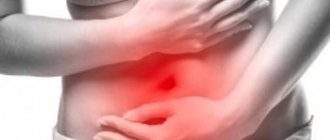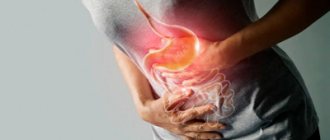Neurosis of the stomach and intestines is a sign of a psychological disorder. Many people confuse it with a gastroenterological disease. But in the absence of any problems with the gastrointestinal tract, men and women may experience strange phenomena in the abdominal area. For example, a feeling of fullness and bloating in the gastrointestinal tract even after one sip of water.
Unfortunately, gastric neurosis must be treated under the supervision of qualified doctors. Symptoms and their causes do not go away on their own, but often progress with age, complicating life activities.
For what reasons does gastric neurosis occur?
This disorder can manifest itself under the influence of:
— Quick snacks and lack of a balanced diet; — The pace of life is too fast, which disrupts the functioning of the gastrointestinal tract; — Internal pathogens (neoplasms and others); - Prolonged nervous condition, nutritional disturbances due to nervous breakdowns.
Signs of gastric neurosis can occur under the influence of both internal and external factors. Therefore, only a specialist can determine the true cause.
How does stress affect digestion?
We live in times of global stress. Of course, it cannot but affect the functioning of our body and can have a negative impact, including on the functioning of the gastrointestinal tract. More often it is discomfort or pain in the abdomen, abnormal stool, and bloating.
If the body remains under nervous tension for a long time, and sometimes even in nervous exhaustion, or becomes very overtired, this can lead to a whole complex of disturbances in the functioning of the digestive, nervous and cardiovascular systems. Symptoms of indigestion due to stress include:
- constant or periodic pain in the stomach and along the intestines, “in the abdomen,” as patients often explain it;
- feeling of quick or early satiety;
- heartburn;
- bitterness in the mouth;
- nausea;
- unpleasant taste in the mouth;
- abdominal cramps;
- diarrhea (diarrhea or pasty stools) or constipation.
All these symptoms can lead to the appearance of inflammatory changes in the gastric mucosa (ulcers and wounds - erosions) or a whole complex of functional disorders.
If the intestinal microflora is disturbed - dysbacteriosis, the production of the hormone serotonin may decrease, and this, in turn, affects the regulation of motility and secretion of the gastrointestinal tract. In addition, serotonin is called the “happiness hormone,” so it can also affect your mood, which leads to an imbalance in the gastrointestinal tract and a tangle of problems is formed.
The connection between the central nervous system and the intestines forms a vicious circle. The brain sends signals to the digestive tract that you are under stress. In the intestine, the absorption of nutrients decreases, the rate of enzymatic reactions decreases, which in turn leads to contraction of the gastrointestinal tract muscles and inflammation, increased sensitivity of the perceiving nerve endings - receptors to the slightest, even normal changes. And vice versa. A signal comes from the intestines to the brain that certain disorders exist. Sometimes this signal is overly intense, distorting the true picture of events. Therefore, the connection between these two systems is very close. It’s not for nothing that they say that “the brain and the intestines have a lot in common, because they both have something to digest.” During times of stress, the most important task of the body is to maintain vital functions, which, by the way, do not include digestion. The process of blood flow and the activity of the blood supply to the digestive system decreases, all processes occurring in the gastrointestinal tract slow down. Chronic stress affecting the human body can lead to such diseases (or serve as a trigger or provoking factor) such as:
- functional gastric dyspepsia;
- gastritis (erosive form) or acute ulcer of the stomach or duodenum;
- irritable bowel syndrome;
- functional disorder of the gallbladder and sphincter of Oddi;
- Crohn's disease or ulcerative colitis.
How to identify gastrointestinal diseases?
First, you need to make an appointment with a gastroenterologist. The doctor will refer you for the necessary examination and prescribe tests, based on the results of which the necessary treatment will be recommended. The foundation for maintaining healthy digestion is following a diet and exercise regimen. You need to remember that the body needs physical activity, but do not forget that it is not recommended to deplete it with excessive physical effort, as this can also negatively affect your digestion. Psychologists and psychotherapists will help you get out of a stressful state.
Most likely, you will be prescribed a reasonable course of sedatives, or psychotherapeutic practices that will help you and your nervous system relax so that the treatment is more productive. Yoga classes, walks in nature, meditation, art therapy and, most importantly, adherence to a sleep and rest schedule have a relaxing effect. You will be surprised how much easier your life will become if you start following a sleep-wake schedule! The main thing in your treatment is your participation in the restoration of the body. To prevent gastrointestinal disorders, it is worth remembering simple rules: - do not snack on the go; - observe sleep, rest and nutrition regimes; - exclude fast food, carbonated water and other junk foods from your diet.
Let's find the good in life and strive for it!
Symptoms of the disease
The disease begins to manifest itself at a fairly early stage, so examination using modern diagnostic methods allows you to choose the right treatment method and get down to business.
Neurosis of the stomach and intestines is manifested by the following symptoms:
- Constant feeling of hunger. It does not disappear even after a heavy meal.
- Bloating, increased gas production. May be accompanied by colic.
- Discomfort in the abdomen. There is pain, heaviness, and a pulling sensation.
- Heartburn. It occurs in the abdomen and can spread to the sternum area.
- Belching. Sometimes a person cannot control the urges. Belching is accompanied by loud sounds and an unpleasant odor.
- Aversion to food. Often, not only the smell, but also the sight of food can cause nausea and severe psychological rejection in a person.
Psychologists also note such signs as the manifestation of a chewing reflex even when there is nothing in the mouth. Patients complain of severe nervous agitation, problems with sleep, and panic attacks. Phobias may also appear. The head begins to ache and feel dizzy, blood pressure rises, and hypochondria is observed.
Treatment of nervous gastritis
Therapy for gastritis should be comprehensive. It involves strict adherence to the prescribed diet and taking medications recommended by a gastroenterologist. If the main cause is stress, then it is necessary to consult a psychotherapist and take sedatives (sedatives), preferably on a natural basis.
Patients are recommended to take Valerian officinalis preparations to treat stress due to gastritis. It not only has a calming effect, but also relieves spasms during attacks of stomach pain, improves appetite and promotes the regeneration of damaged mucous membranes. It is recommended to take Valerian in tablet form rather than as a tincture.
For herbal medicine for nervous gastritis, the medicinal plant elecampane is also used. It helps relieve pain and normalize the functional activity of the stomach. In pharmacies you can buy Mesi-Vit or Elecampane P tablets.
It is important to stabilize the psycho-emotional state in order to avoid the progression of pathology and the development of complications. Relaxation techniques are of great importance for getting rid of stress and gastritis directly associated with it. The ability to relax in a timely manner allows you to avoid stress, and consequently, relapses of gastritis.
The text was checked by medical experts: Head of the socio-psychological service of the Alkoklinik MC, psychiatrist-narcologist L.A. Serova.
CAN'T FIND THE ANSWER?
Consult a specialist
Or call: +7 (495) 798-30-80
Call! We work around the clock!
What causes gastritis?
There are several causes for the development of gastritis, including poor nutrition, smoking, frequent consumption of alcoholic beverages and exposure to an infectious agent (the bacterium Helicobacter pylori). Stress has become one of the most important factors these days.
The autonomic nervous system, which is responsible for the contraction of smooth muscle elements, actively reacts to psycho-emotional stress. Under stress, gastric motility is disrupted and the blood supply to its mucous membrane suffers. These pathological changes are a kind of trigger for the development of stomach diseases.
Important: The progression of gastritis can lead to the development of stomach ulcers and even the appearance of malignant tumors.
Symptoms
Hyperventilation syndrome is a disease that occurs in crises. The symptoms of the syndrome appear quite unexpectedly and very powerfully, while the symptoms after a certain period of time cease to bother you until the next attack. As a rule, symptoms bother patients from several minutes to 1-2 hours.
A hyperventilation crisis begins with fear and unreasonable anxiety, which are simultaneously accompanied by a feeling of lack of air, a lump in the throat, the inability to take a full breath, and shortness of breath. These symptoms can appear simultaneously with fear and anxiety, or come with a slight delay. As a rule, symptoms progress and patients are overcome by a new fear - the fear of death. Next, disturbances occur in the cardiovascular system, such as high blood pressure, rapid pulse, chest pain, and so on. Fear gradually develops into panic. Often other symptoms appear, which can be divided into 5 groups:
- Autonomic symptoms are manifested by urinary disorders, cardiovascular, respiratory and gastrointestinal disorders;
- Motor and muscle-tonic disorders;
- Clouding of consciousness;
- Mental disorders;
- Sensory organ disturbances, pain.
Let's consider each identified group of symptoms separately.
Urinary disorders
As a rule, this disorder worries patients closer to the end of the crisis. Patients produce a large amount of urine, urinate frequently, and the color of the urine becomes light, close to transparent.
Cardiovascular disorders
During hyperventilation crises, disturbances in the cardiovascular system occur quite often. Their list includes:
- Chest compression, pain;
- Feeling every heartbeat;
- Stitching, aching, squeezing or shooting pain in the heart;
- Heart rhythm disturbances;
- Pressure surges;
- Feeling of discomfort in the heart area;
- Raynaud's syndrome;
- Excessive sweating;
- Blue discoloration of feet and hands;
- Hearing impairment, noises in the head;
- Headache;
- Changes in ECG;
- Unsteady gait;
- Dizziness.
Respiratory disorders
Respiratory disorders are an obligatory “guest” during a hyperventilation crisis. Violations along this line have the following symptoms:
- Lack of air;
- Feeling of empty breath;
- Excessive concentration on the breathing process.
Patients often complain that they want to take as deep a breath as possible, but no matter how hard they try, this is not possible. As a rule, such patients during a crisis have a normal rhythm of exhalation and inhalation, and the breathing itself is deep and rapid. The reason for dissatisfaction with your breathing in this case is a crisis stressful situation, in which all sensations intensify significantly.
Patients often complain that they simply cannot stop making efforts to take each breath: it seems to them that if they stop their efforts, they will stop breathing altogether.
When patients cannot take a full breath due to the presence of obstacles such as a tight chest or a lump in the throat, they prefer to concentrate all their attention on what is preventing full breathing. Patients try to cope with the “obstacle”, finding the cause of difficulty breathing solely in themselves. As a rule, such patients breathe extremely quickly, making enormous efforts for each inhalation and exhalation with muscle tension, which do not take part during quiet breathing. Breathing becomes frequent and unrhythmic. In some ways, these symptoms of a hyperventilation crisis resemble the symptoms of asthma.
Frequent symptoms are sniffling, yawning, coughing and sighing, repeated frequently and, again, for no reason. They usually do not cause discomfort or fear in patients, but they affect the gas composition of the blood and disrupt its acidity. These symptoms are not relevant for the crisis state of hyperventilation syndrome.
Gastrointestinal disorders
In the vast majority of cases, hyperventilation syndrome is accompanied by disturbances in the functioning of the gastrointestinal tract. The list of symptoms includes:
- Vomit;
- Rumbling in the stomach;
- Bloating;
- Belching;
- Constipation or diarrhea.
- Abdominal pain;
- Intolerance to foods that were previously digested normally.
Motor and musculo-tonic disorders
In 9 out of 10 cases, hypertensive crises are accompanied by these disorders, which are represented by the following disorders:
- Trembling in the arms and legs, most often with a feeling of cold or heat;
- Chvostek's sign (excessive readiness of muscles to contract);
- Carpopedal spasm (the foot bends, the fingers are folded in such a way as if the patient were taking a pinch of salt).
Changes in consciousness
Symptoms of changes in consciousness include the following:
- Mild blindness, blurriness, fog in the eyes, darkening;
- Presyncope;
- Fainting;
- The feeling that familiar events never happened and, conversely, events unknown to the patient are allegedly repeated;
- Loss of personality, expressed in the patient’s thoughts regarding his reincarnation (depersonalization);
- Loss of reality, expressed in the feeling of being in an unreal world: a film, a fairy tale, and so on (derealization).
Mental disorders
At the time of a hyperventilation crisis, the mental state of patients deteriorates significantly, but it does not indicate insanity and does not cause inappropriate behavior. Mental disorders are manifested by the patient's current thoughts and experiences. Symptoms along this line include:
- Sadness;
- Yearning;
- Fears;
- Anxiety;
- Unreasonable worries;
- An overreaction to any situation.
Sensory organ disturbances, pain
Hyperventilation syndrome in a state of crisis always leads to pain and causes sensory disturbances. Symptoms along this line are extremely varied. The most popular symptoms are:
- Burning, tingling, sensation of “goosebumps”;
- Numbness of the limbs and parts of the body (usually the hands and face, the rest - less often);
- Feelings of advancing paralysis;
- Distinct pain in the head, stomach, heart and other parts of the body and organs;
- Pain with every convulsive contraction of the muscles.
Symptoms of Irritable Bowel Syndrome
Tortured intestines. Either diarrhea or constipation. And pain in the abdomen, as if during contractions. I even had a colonoscopy - but, fortunately, everything turned out to be okay. The doctor suggested it was irritable bowel syndrome. What are the symptoms of this disease?
There are a number of signs that indicate irritable bowel syndrome (IBS), which affects between 15 and 48% of the population. Among the most common are pain, rumbling and cramps in the abdomen, problems with stool (diarrhea or constipation, and more often their alternation), increased gas formation (flatulence). Sometimes atypical complaints also arise - for example, headaches and frequent urination.
Most often, a “concert for drum and orchestra” is played out in the stomach in the evenings, and especially after eating gas-forming foods (fresh vegetables and fruits, black bread). Symptoms usually subside after a bowel movement. Emotional shocks, anxieties and worries often lead to exacerbations. And finally, an important point - by morning the pain and discomfort usually disappear. If your stomach aches in the morning no less than in the evening, then this most likely does not indicate a functional disorder, but some more serious diagnosis.
Under no circumstances should you tolerate severe abdominal pain that cannot be treated with antispasmodics. Indeed, such a sign may hide a life-threatening surgical pathology that requires urgent surgery (for example, acute appendicitis, cholecystitis or pancreatitis). In such a situation, you need to call an ambulance.
However, even if the clinical picture fully corresponds to this description, a diagnosis such as IBS can only be made after an examination that shows that there is nothing more dangerous. If there are no changes in the mucous membrane, and discomfort in the intestines persists for longer than three months, and the stomach ache at least three times a week, then the doctor has the right to talk about the presence of this very syndrome.










